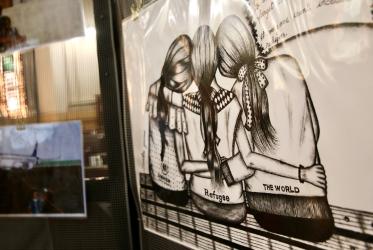The World Council of Churches (WCC) coordinated an ecumenical delegation that attended the World Conference on Statelessness and Inclusion held 26-28 June at The Hague.
More than 290 stateless activists, academics, non-government organizations, UN officials, artists, government officials and journalists from across the world met to critically assess and formulate responses to statelessness in the world today.
Voices from the delegation
“We wanted to bring an international ecumenical delegation to this event to share with the participants about the role of churches and other faith communities in challenging and addressing structures that are creating statelessness,” said Segma Asfaw, programme executive at the WCC. “Churches and religious communities in general have a wide and solid network that civil society actors can work with in their work to address the plight and struggles of stateless people.”
Rev. Karin Van Den Broeke, from the Protestant Church in the Netherlands and a WCC Executive Committee member, said that participating in the World Conference on Statelessness as part of the WCC delegation was an excellent opportunity to share with people about the Pilgrimage of Justice and Peace. “We also connected with the local Protestant church in the Netherlands in an inspiring way,” she said. “The WCC delegation visited the Bethel Chapel where a few months ago the Church Asylum project took place, to protect an Armenian family from deportation.”
Dr Mathews George Chunakara, general secretary of the Christian Conference of Asia, said: “The World Conference on Statelessness addressed some of the most pertinent issues related to the statelessness in Asia, where 40 percent of the identified stateless population of the world live in most deplorable situations.”
Dr Audeh Quawas from Jordan, in charge of Ecumenical Relations for the Greek Orthodox Patriarchate of Jerusalem, and also a WCC Central Committee member and member of the WCC Commission of the Churches on international Affairs, said that statelessness remains a critical burning issue in the Middle East, often overlooked and misunderstood. “As churches, we have to work with our legislators to change our discriminatory laws,” he said.
Rev. Kelli Jolly of the Methodist Church in the Caribbean and the Americas explained that “as a Bahamian Woman, I attended this conference under the strong conviction that the people in my country deserve better than to live satisfied with a life of gender inequality, my future children and generations after them deserve a better life than to live the same reality of gender inequality that exists presently, and I am compelled to make sure that I live embracing my own responsibility for making this better life a reality.”
Dr Nathan Hosler, director of the Office of Public Witness, Church of the Brethren, noted: “The WCC's work to organize member communions to address statelessness is a critical addition to the growing movement addressing this important topic.”
Canon Andrew Khoo, Diocese of West Malaysia, Church of the Province of South East Asia, said: “Statelessness is a critical contemporary issue that needs to fully emerge from the penumbra of the phenomenon of mixed migration and be fully addressed head on.”
Prior to the Conference, the delegation had a preparatory meeting hosted by Rev. Derk Stegeman, President of Stek, “Stad en Kerk” , the diakonal organisation of the Protestant Church in the Netherlands. The delegation members learned about the Church Asylum project, a 96 days-long round-the-clock prayer service from fall 2018 and to January 2019 to prevent an Armenian family from being deported from the Netherlands.







